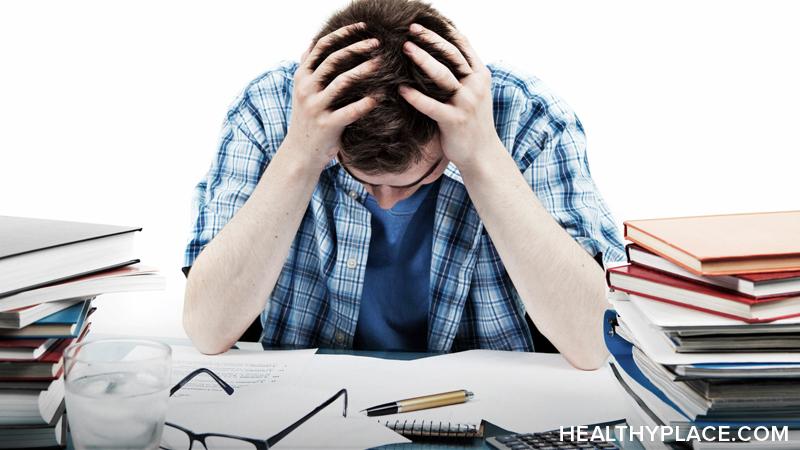The Difference Between Anxiety and Stress

Anxiety and stress are often mistaken for the same experience. This is a misconception, however, as there is a clear difference between anxiety and stress.
Stress is our reaction to events that upset our physical and mental balance. Anxiety, on the other hand, is often considered to be a reaction to stress. Once anxiety revs up as a stress response, worry, fear, emotional and physical symptoms, and behaviors like hypervigilance or avoidance take over.
Another fundamental difference between stress and anxiety is cause. Stress typically has a discernable source. Someone can identify why they are stressed (Need Self Help for Stress? Try These Tips). While we know that anxiety is a reaction to stress, beyond that we don’t always know the root cause.
Everyone experiences stress, but not everyone experiences anxiety. Anxiety is an extreme reaction to stress that can be considered a disorder and is classified in the Diagnostic and Statistical Manual of Mental Disorders, Fifth Edition, or the DSM-5 (American Psychological Association, 2013). Stress is not considered to be a disorder.
The Process of Stress and the Stress Response
When we’re under stress, systems in our body kick in to help us with a quick surge of energy to stay and “fight” or to get away in “flight”. The following physiological process occurs when we’re stressed and/or highly anxious (Balch, 2012):
- The pituitary gland releases a hormone called adrenocorticotropic hormone (ACTH).
- ACTH travels to the adrenal glands to prompt them to convert such things as cholesterol into cortisol.
- Cortisol triggers changes in the body chemistry, stimulates the release of glucose in the liver, blocks the immune system from causing inflammation, and makes the red blood cells more likely to clot.
- The adrenal glands also make and release adrenaline (epinephrine) to prepare the body to fight or flee.
Because of the fight-or-flight response, people can experience physical, emotional, and cognitive symptoms such as difficulty thinking, concentrating and remembering. These reactions are part of both stress and anxiety.
An important difference between anxiety and stress is that anxiety persists after the stressor has been removed, and the response cycle initiated by ACTH doesn’t turn off. Stress eventually diminishes, whereas anxiety keeps going. In fact, for most anxiety disorders to be diagnosed, symptoms must be present for at least six months (American Psychological Association, 2013).
Factors That Turn Stress into Anxiety
Why does anxiety, a response to stress, continue in some people even when the original stress has lessened? Stress, anxiety, and people are all complex and multi-faceted, so there are no obvious or definitive answers. What researchers have discovered is that there are certain factors that impact the likelihood that anxiety will become life-inhibiting. These factors can include:
- nature of the stressor (mild, moderate, severe, life-threatening, situational, etc.)
- number of stressors faced at once
- duration (the longer stress lasts, the greater the risk of it continuing as an anxiety disorder)
- degree of control one has over his or her stressors (less control means more anxiety)
- biological factors (genetics, condition of health)
- presence of protective factors (the more protective factors in someone’s life, the more likely they are to reduce stress and address anxiety before it becomes problematic)
How to Handle Stress and Anxiety: Restoring Wellness
Stress and anxiety both disrupt our balance. To handle stress and anxiety and maintain a quality life, people need stability within themselves and in their world. Stress is very disruptive to mental health and wellbeing, so to prevent anxiety from taking over, it’s important to restore balance.
Cortisol, epinephrine, and ACTH disrupt normal functioning in our body. When they are present when not needed, they interfere in immune system functioning, elevate blood pressure as well as maintaining the clotting factor of red blood cells—increasing risk of heart disease or heart attack. We feel fatigued. And we are at risk for depression and anxiety disorders. We can restore physiological balance through proper diet and exercise as well as taking measures to reduce stressors in our lives (List of Foods That Help and Hurt Anxiety).
We all have protective factors that we can use to manage stress and anxiety. Examples of protective factors:
- coping skills (breathing exercises, mindfulness, journaling, doing pleasurable activities, etc.);
- increasing and drawing on social support systems like family, friends, coworkers, members of an organization or religious institution we belong to, and more;
- attending to our outlook on life and becoming realistically optimistic rather than focusing on problems;
- seeking purpose and meaning in our lives;
- separating ourselves from our problems and stressors, also known as defusion;
- accepting what we can’t change and taking steps to change what we can.
One final difference between anxiety and stress: stress is often about control over our present lives, whereas anxiety is about control of our future (Imparato, 2016). Use the above protective factors to enhance your control. There’s no difference here: you can empower yourself to overcome both stress and anxiety.
APA Reference
Peterson, T.
(2021, December 21). The Difference Between Anxiety and Stress, HealthyPlace. Retrieved
on 2026, January 14 from https://www.healthyplace.com/self-help/anxiety/the-difference-between-anxiety-and-stress



